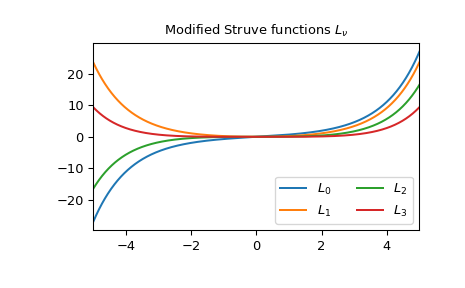scipy.special.modstruve#
- scipy.special.modstruve(v, x, out=None) = <ufunc 'modstruve'>#
Modified Struve function.
Return the value of the modified Struve function of order v at x. The modified Struve function is defined as,
\[L_v(x) = -\imath \exp(-\pi\imath v/2) H_v(\imath x),\]where \(H_v\) is the Struve function.
- Parameters:
- varray_like
Order of the modified Struve function (float).
- xarray_like
Argument of the Struve function (float; must be positive unless v is an integer).
- outndarray, optional
Optional output array for the function results
- Returns:
- Lscalar or ndarray
Value of the modified Struve function of order v at x.
See also
Notes
Three methods discussed in [1] are used to evaluate the function:
power series
expansion in Bessel functions (if \(|x| < |v| + 20\))
asymptotic large-x expansion (if \(x \geq 0.7v + 12\))
Rounding errors are estimated based on the largest terms in the sums, and the result associated with the smallest error is returned.
References
[1]NIST Digital Library of Mathematical Functions https://dlmf.nist.gov/11
Examples
Calculate the modified Struve function of order 1 at 2.
>>> import numpy as np >>> from scipy.special import modstruve >>> import matplotlib.pyplot as plt >>> modstruve(1, 2.) 1.102759787367716
Calculate the modified Struve function at 2 for orders 1, 2 and 3 by providing a list for the order parameter v.
>>> modstruve([1, 2, 3], 2.) array([1.10275979, 0.41026079, 0.11247294])
Calculate the modified Struve function of order 1 for several points by providing an array for x.
>>> points = np.array([2., 5., 8.]) >>> modstruve(1, points) array([ 1.10275979, 23.72821578, 399.24709139])
Compute the modified Struve function for several orders at several points by providing arrays for v and z. The arrays have to be broadcastable to the correct shapes.
>>> orders = np.array([[1], [2], [3]]) >>> points.shape, orders.shape ((3,), (3, 1))
>>> modstruve(orders, points) array([[1.10275979e+00, 2.37282158e+01, 3.99247091e+02], [4.10260789e-01, 1.65535979e+01, 3.25973609e+02], [1.12472937e-01, 9.42430454e+00, 2.33544042e+02]])
Plot the modified Struve functions of order 0 to 3 from -5 to 5.
>>> fig, ax = plt.subplots() >>> x = np.linspace(-5., 5., 1000) >>> for i in range(4): ... ax.plot(x, modstruve(i, x), label=f'$L_{i!r}$') >>> ax.legend(ncol=2) >>> ax.set_xlim(-5, 5) >>> ax.set_title(r"Modified Struve functions $L_{\nu}$") >>> plt.show()
